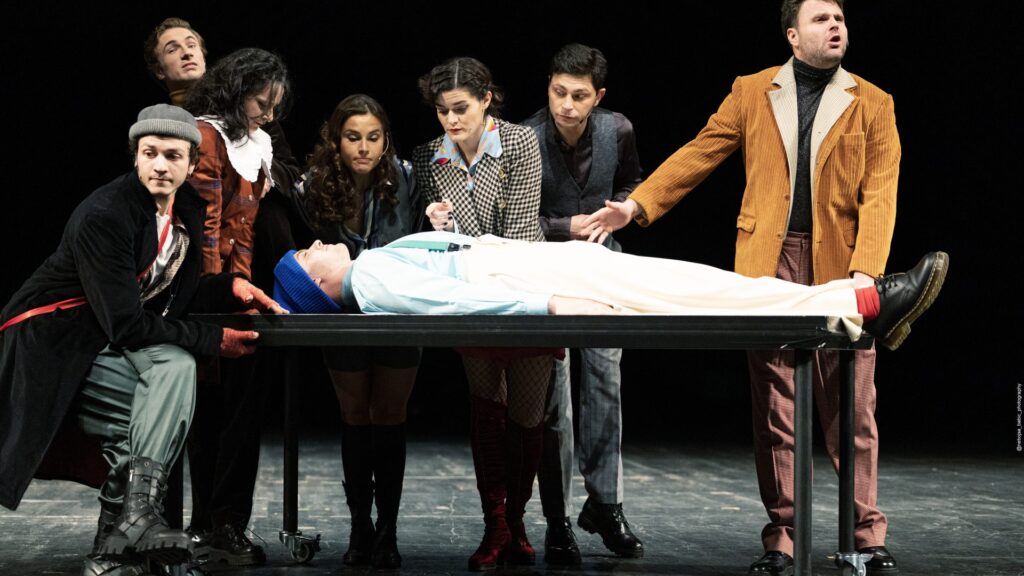Yugoslav Drama Theatre, Belgrade, premiere 18th December 2023
It’s neither to be or not to be – it has to be.
Gunter Grasse’s 1959 coming-of-age novel The Tin Drum is considered to be one of the most significant pieces of 20th century literature, pushing against the boundaries of the literary traditions of the period in which it was written. It tells the story of Oskar Matzerath (Miodrag Dragičević), a thirty-year-old psychiatric patient who grew up during the rise of Nazism and the Second World War and decided to stop growing. Protesting against the cruel, unjust world of the adults around him, Oskar offers his commentary on these historical events from an unfiltered, child’s point of view.
Vasil Hristov’s production for the Yugoslav Drama Theatre places the novel in a metatheatrical setting (dramaturgy by Vesna Radovanović). The narrator of Hristov’s production is Oskar himself, watching his life play out before him and occasionally directing it. He is sharp and censorless: seemingly naive, but in reality well aware of everything that is going on around him, like children often are.
All the actors, apart from Dragičević, portray several different characters, including playing themselves – the actors who are creating the performance. The acting is multi-layered, leaning into the comedy and repetitiveness of performance-making, but also knowing when to rein it in and convey the seriousness of the story itself. I was absolutely blown away by the actors’ precision and the way in which they differentiated between many opposing points of view. For example, Jovana Belović, as both Agnes and Maria, created two characters who were seductive and passionate in a subtly different manner, while Marko Janketić’s Alfred Matzerath and Sigismund Markus represented two completely opposing characters. Some of Joakim Tasić’s and Teodor Vinčić’s characters played into the dark side of comedy, like the role of Rasputin or a talking pork roast. Meanwhile, Iva Manojlović’s roles of Schugger Leo and Anna Bronska really showed range and assisted in showing a collective downfall of mankind. The characters themselves are quite stereotypical, which is understandable given that there were so many of them which had to be delivered in short periods of time, but the actors do a strong job of playing them.
The performances were well matched in quality and energy, the performers understanding how to deliver all the necessary emotional peaks and valleys while not trying to outshine each other; rather they worked together to paint a picture of a society which seems to repeat its faults.
The minimalist set design (Konstantin Trpenoski -mvv.design) provides subtle but picturesque details at first, such as the portraits of Hitler and Beethoven coming down from the sky, the cross made out of stained glass, or the lightbulbs reminiscing of the night full of stars. In this manner, the set design steadily assists the story to a climactic ending where the living and the dead sit in chairs and get lifted above the ground, into a dance macabre-ish carousel which left the public speechless. Costume design (Marija Marković Milojev) works hand in hand and accurately follows the different time periods such as the 1950’s and 1970’s in Europe, staying on point with all the details as well and completing the illusion of time passing. Music (Nikola Kodžabašija) is skilfully done as well, especially combined with multiple moments of Oskar banging on his in drum or screaming in an ear-shattering manner.

The Tin Drum at Yugoslav Drama Theatre. Photo: Nebojsa Babic
I enjoyed the performance so much, I went back and saw it for a second time and while the performance in general was just as good the second time around, in terms of its precision, energy, and harmony, something was different, and I have been trying to work out exactly what this was. The humour still worked and the tragedy once again hit deeply, but the experience just wasn’t as all-consuming for me as it was the first time around. The public’s reaction was equally visceral as the first time, so this has nothing to do with the quality of the performance, however, perhaps the whole concept of meta-theatricality got a bit tiresome on the second watch. Inevitably it lacked the freshness of the first time I experienced it.
None of this is a reflection on the production itself, which is exceptionally strong, smart, and precise. Combining devastating cruelty with a great sense of humour, Vasil Hristov’s production certainly evokes many questions and points fingers not just at the public, but at the theatre makers as well. Alfred Matzerath choking to death on his party badge, or Schugger Leo hopelessly looking for absent God aren’t necessarily new ideas, but they are certainly still recognisable to us as viewers today – which is what makes them – and this performance – devastatingly relevant, over and over again.
Credits:
For tickets and more information, visit: JDP.rs
Ana Ogrizović is a Dramaturgy graduate from Serbia, recognised by multiple poetry, prose and playwriting competitions. She is currently pursing a Masters degree and editing her first poetry book.








